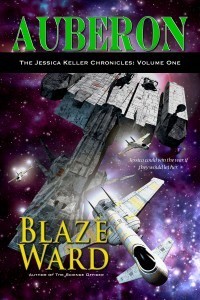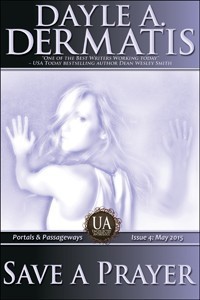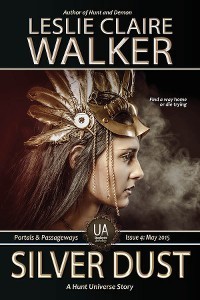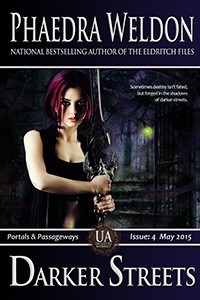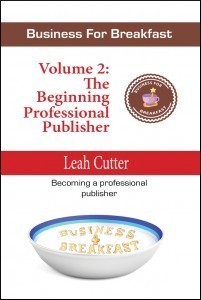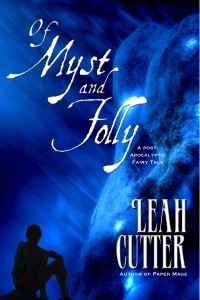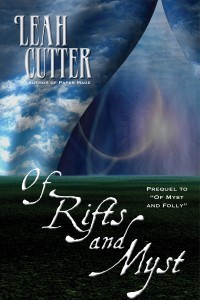Leah R. Cutter's Blog, page 11
May 5, 2015
New novel available!
Nope. Not one of mine.
But the first novel by my sweetie, Blaze Ward.
It’s space opera, military SF, with great characters and a great heart.
Here’s the blurb:
Jessica Keller has a reputation as a maverick commander. It almost got her court martialed. Now it has gotten her a new command in an obscure sector, with orders to ignite a new front in the eternal war.
But her old nemesis, Imperial Admiral Emmerich Wachturm, stands in her way.
Worlds will fall before their feud ends, but only if she can forge her crew of strangers into a weapon. Otherwise, disaster looms.
Available for $5.99 as an ebook from your favorite retailers, $14.95 as a paperback from Createspace.
I’m really excited about this novel coming out. And if you’re local, we’ll be having a release party at Cupcake Royale on Saturday. Send me a message if you need the details (we tried to invite everyone, but we may have missed people.)
So go! Enjoy! It’s a good novel. And I’m not just saying that because I’m biased… (^_^)
Crossposted from my website. If you'd like to comment, you can do so here or there.
May 2, 2015
Thank you!
I ran a Goodreads giveaway this past week for Poisoned Pearls, in anticipation of the sequel, Tainted Waters.
I wanted to thank everyone who signed up, who put the book on their “To Be Read” list, who’ve read the book and have done reviews. I really appreciate it. I sent out the copies this morning-they both should arrive before the end of May.
I’ll be doing one more give away of Poisoned Pearls,, then a give away of Tainted Waters just before the book comes out at the end of May.
SO EXCITING.
I adore Cassie, I love her Voice, and I am pleased with where she ends up in Tainted Waters. I hope you are too.
There will be other NEWS in a couple weeks (I’ve signed contracts but can’t really talk about it yet.)
Today’s coffee is a Sumatran bean with a medium roast. The bean itself has such a dark, rich, heavy flavor, I was very unsuccessful doing a lighter roast with it. This medium roast though is divine. I’d been thinking that I wouldn’t get this bean again, since the previous roasts weren’t very satisfying. Now I believe I will try this bean again.
Next up: an Ethiopian bean from my local cooperative. Will roast that next week.
Crossposted from my website. If you'd like to comment, you can do so here or there.
May 1, 2015
New Short Story–War On All Fronts

YAYAYAYAYAY!! New fiction! This is actually a novella. Had really planned on it being a short story, but the story had its own ideas. AND it’s the sequel to Dancing with Tong Yi.
The blurb:
Tong Yi carries the mysterious message of Zhang Gua Loa back to his boss.
The immortal had said there would be war. But between whom? And why?
Huli Transport takes advantage of the situation to become the messenger service of choice in the war zone. They promise to remain neutral, and to deliver messages to all sides.
In the meantime, Tong Yi has battles of his own to fight, both with his older brother and his own growing understanding of magic.
But in the middle of a war, is it possible for him to remain neutral? Or has his side already been chosen for him?
Available at Amazon, Kobo Books, Barnes and Nobel, and iBookstore.
This novella is ALSO part of the Uncollected Anthology series! Issue #4: Portals and Passageways.
Go check out the other fabulous writers and their stories!
Kirev’s Door
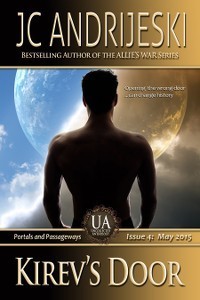
By our extra special guest author, J.C. Andrijeski!
Kirev is a seer. Raised in an alternate version of our Earth, where his people are enslaved under human owners, Kirev joins a resistance army of rebel seers after spending most of his youth in work camps and brothels. He wants to help his people, but during his first mission with the seer rebels, Kirev faces a terrifying new future when a voice from his past intervenes and sends his life into a whole different direction.
This is a spinoff story from the ALLIE’S WAR series
Save A Prayer
Former Hollywood party girl Nikki Ashburne sees ghosts—in fact, many of them are her friends. Okay, they’re kind of her only friends. Most ghosts stick around because they’re happy here and have no desire to move on. So when she encounters a trapped and, quite frankly, batshit insane member of the formerly living, she’s driven to help…even though she hasn’t a clue how.
Rites of Passage
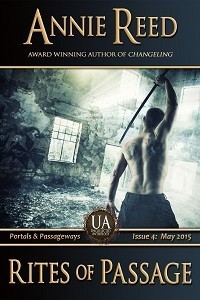
By Annie Reed
Finn guards this world from the monsters from the other side. Slays their servants before they can finish creating passageways into our world for their masters.
Important work. Lonely work. Work that killed Finn’s own master when he got careless after too many decades on the job.
And Finn’s been doing this work for a very, very long time.
The Streets Where We Live
When Portia receives a call from an old friend she hasn’t talked to in years, she knows something terrible has happened. But when Portia realizes just how terrible—fifty kids missing from a Chicago theater with millions of dollars in damage left behind—she knows she’ll need backup from her magical sisters. Nothing about this latest case makes sense, magically or otherwise. And when she finally starts to discover the truth, Portia realizes that truth might be darker and more insidious than she ever imagined.
Silver Dust
Silver had it all—eternal life, long–term memory, and a real sweet princess gig as the heir to the Faery King’s throne. But then the Faery realm caught a terrible disease, and she tried to save her people by taking the sickness into herself. She ended up banished with a price on her head and only days to live. The cure cost her memory and left her in hiding, a stranger to herself.
When her one friend in all the worlds disappears while trying to help her find a way home, Silver must come out of the shadows to save him. She must face the danger and the unknown lurking in the Human and Faery realms—and in her own strange heart and soul.
Darker Streets
The Cavanaugh Family is known for banishing the last of the Twelve High Demons of Hell with the help of the magic sword, November.
Fifty years later, the most powerful of those Demons escapes its prison and kills the Demon Hunter who imprisoned her. The Demon’s next target—Taylor Cavanaugh, the latest and only Heir to November.
But Taylor doesn’t know how to swing a bat, much less a sword. Her family’s failure to educate her about any of its history could prove to be her undoing unless she proves herself the Heir and wields the sword before the Demon known as Abbadon destroys her.
Crossposted from my website. If you'd like to comment, you can do so here or there.
April 16, 2015
Business for Breakfast V2: Chapter One
The following is a chapter from Business for Breakfast, Volume 2: The Beginning Professional Publisher.
The ebook is available from Amazon, Kobo Books, Barnes & Noble, iBookstore, and the paper version is available from Createspace.
However, if you’re like most publisher (unwilling to spend money unless absolutely necessary) I will also be posting a chapter a week, so you’ll merely have to have patience to read all twelve chapters.
Chapter One
Initial Decisions
Congratulations! You’re considering publishing your own work! Or perhaps you’re already publishing, and just want to go back over the basics.
This chapter will walk you through the initial steps.
You And Who?
One of the first things for you to think about is whether you want to publish just yourself or if you’re also going to publish other people.
Maybe you don’t want to be a big publisher. Maybe you just have a mother–in–law with a fascinating story that you want to capture. Maybe you have a friend who has this collection of poetry that you’d like to publish for them. Maybe you have other projects of the heart that you’d like for the world to see.
Or perhaps you just want to publish yourself, and you’ll never touch someone else’s manuscript. It’s your House, and yours alone.
Or possibly you have kind of a head for business, and you’ve always wanted to be a publisher. So you plan on being a bigger press, and working with many artists.
One of your first decisions will be to figure out your size, both current and future.
I started off knowing that I wanted to publish other people. I knew that I have a good head for business, and that I liked business.
It still took me three years before I added another writer. I needed to make sure that all the aspects of my business, in in particular, the accounting, were in place before I more than doubled the complication of adding another person.
Adding one more person after the first didn’t triple the complication. I knew it would grow more complicated, but once the infrastructure was in place, it just meant a bit more work.
Changing Size
You may not know that you want to publish other people. Perhaps you haven’t done any publishing yet and so you don’t know if you’re going to like it or not.
Or perhaps you think you’ll be a bigger publisher, only to find out just how much work it is, and decide to publish only yourself.
While that initial decision is important, it’s also important to realize that you can change your mind later.
My advice would be to start small and grow from there. Get your toes wet, then your feet, then decide if you want to move further into the water.
The Name Game
Once you’ve some idea of your size, if you’re going to be just strictly you or a stable or writers., you get the fun job of picking a name for your press.
As a writer/artist, you already understand that names are important. Part of the name game, though, is to match the name of your business with your plans.
I would suggest that you choose a more serious, professional name. On the one hand, it might be funny if you became a best seller and during an interview, made the interviewer have to say the name of your publisher: Mac–Fluffy–Snuckums Press.
On the other hand, if you do write a best–selling novel, you’d like people to take you seriously. That will be easier if the name of your publishing house sounds professional.
If you really want to name your publishing business after your cats, possibly just use their initials: MFS Press.
Another thing to think about: choose a name that doesn’t reflect a single genre.
Perhaps you only write science fiction, and so you want your press to reflect that, and plan on calling it Spaceship Monkeys Publications.
I would caution against this. You’re limiting yourself with that kind of name. While it’s indicative of what you’re writing today, as an artist, you’re also limiting your growth. Who’s to say that you might not read some fantasy book and decide, “I can do better than that.” Then go on to start to love the genre and become a best–selling author in that genre.
I’m not saying choose a bland, generic name. But choose one that will allow you to write in all genres, that will still fit ten, twenty, fifty years from now.
Once you choose a name, the internet will be your friend. You must do searches on that name, both how you’re spelling it as well as alternate spellings. You may have picked an absolutely awesome name—only to find out that someone else is already using it. So be sure to look around before making your final decision.
You may also want to check with other people about the name you’ve chosen, people who are in different social circles. They may see something about your name, or know that it’s disrespectful slang.
Separation
You have a great name for your publisher. You have some idea of who you want to publish, the size you want to get to.
Now, you need to start thinking of that publisher as a separate entity.
It is a separate business from your writing. It will generate separate income.
You need to set up a separate bank account for your publisher. This will make it very easy, later, when it comes time to do your taxes, as your income for your business has been separate from your other income.
In addition, you need this information before you start setting up accounts with distributors.
Before I could open a bank account for my publishing business in Washington State, in the US, I needed to get a business license. You will need to check with the laws of your country/state/province to see what’s required as part of your banking laws.
If you’re an American, I would also recommend getting an Employee Identification Number, or EIN. This will also become important later. You’ll use this number instead of your own Social Security Number for setting up distributors, signing contracts, etc.
Web Presence
Everyone will tell you that you need to get a web site and use your publisher’s name as the domain, such as www.FlyingPinkMonkeys.com.
In general, this is good advice. Let me explain why.
Suppose you want to submit your work to a review site such as Publisher’s Weekly.
Publisher’s Weekly is used to dealing with traditional publishers, not authors. They expect to receive books from publishers.
This means, as part of your cover letter, you list the name of your publishing company, as well as the web site. You need to look like a business to them if you want them to take you seriously.
You may want to set up someone as your publisher as well. That way, all correspondence comes from someone who is not you. This could be a friend of yours, who agrees to be your publisher. Or it could be just a persona you assume.
Do you need to spend a lot of time and effort on your publisher’s website up front? Not necessarily, but you should start building it as soon as you start publishing. It’s easier to just add to an existing site than to have to build it from scratch when you have a dozen books.
Another site that you need to build (or make sure that your authors build) are your author website or sites. This is not the same as the author’s Twitter account, Facebook, Tumblr, etc. (It may or may not be where the writer, primarily communicates with their fans. Building up that web presence is for author, not the publisher. However, as a publisher, you might be encouraging your authors to build up their social media sites.)
Your author site preferably has the author name as the domain (www.LeahCutter.com) This site contains information about the author’s books.
The landing page for the author site should contain the following:
What’s just been released
What’s coming
How to contact the author
Signing up for the author’s newsletter
Social media links
Upcoming events
These are the pieces of information that readers want to know. Tell them about your cats in your social media posts. Tell them about your books and your business up front.
If you write in series, you might want to create a separate page for each series, so readers know what order the books are in. If you have a lot of books, you might want to think about creating a FAQ to direct readers to the book they should start with.
Some writers choose to put the majority of their effort into their author site, and just use the publishing site for correspondence and for publishing. Their publisher’s site is static, with links to their author site as well as a page for retailers.
If you decide to sell books through your website, I would recommend doing that on your publishing site, and keep the businesses separated.
If you’re publishing more than one person, you need to put more effort into your publishing site. If you’re also offering services, such as editing, cover design, career advice, I would recommend doing that through your publishing house, and keep your writing separate.
There are many different ways to run a business. You get to choose how to show yours to the world.
Web Hosts
Talk with other writers to find out what they are using. Make sure it’s an actual web host. There are a lot of fake services out there.
Whatever service you use, I cannot recommend strongly enough to use whatever privacy service your web host offers. (If your web host doesn’t offer a privacy service, go find another web host.)
Let me explain what a privacy service does.
When you register your domain name, you need to fill in information, such as your name, address, phone number, etc.
That information is now public record. Anyone can access it.
That is, unless you use your web host’s privacy service.
If you use your web host’s privacy service, a casual inquiry will show the web host’s information, not yours. (For those of you more technical, it’s what’s returned with a WHOIS command.)
Perhaps it doesn’t matter to you now that your address and phone number are easily available.
What happens if you write the next Harry Potter book? You might not want to move, but you might have to if anyone with a computer can figure out where you live.
Assume success. Plan for victory.
Choosing Partners
As part of your plan, you should decide which distributors you’re going to use for your work, such as (for today): Amazon, Barnes and Noble, Draft2Digital, Createspace, Audible, etc.
Make a list. Then do some investigation. There are horror stories about every single one of those platforms.
Which ones will you choose, going in with your eyes open? They’re all businesses. Sometimes you have to put up with unpleasantness in order to do business with a partner.
Decide your pain points. Do your research. Read the terms of service for each and every partner.
Then, and only then, set up accounts with them.
In Conclusion
The three things you need to remember about first steps:
Decide who you want to publish.
Choose a professional sounding name for your publishing house.
Your web presence is important. Choose a good host and use their privacy service.
The ebook is available from Amazon, Kobo Books, Barnes & Noble, iBookstore, and the paper version is available from Createspace.
Crossposted from my website. If you'd like to comment, you can do so here or there.
April 11, 2015
oooooopppppssss
So, it appears, that on Thursday, I forgot to post the first chapter of Business for Breakfast, Volume 2: The Beginning Professional Publisher.
Ooppss?
My excuse is that a cable was damaged in my neighborhood, and I was without internet for 18+ hours (along with 33,000 other customers.)
I’ve coded up the posts for the next three weeks, so there shouldn’t be another interruption.
My apologizes. I will endeavor to not let it happen again.
Crossposted from my website. If you'd like to comment, you can do so here or there.
April 7, 2015
New business book!
Yup. I wrote another one. There’s at least one more that I really want to write, and it’s about running a vacation rental. There are more that I’d like to do, for example, partnering with a lawyer to do one on contracts. But we’ll see what I have time to do.
Here’s the blurb:
This book isn’t going to give you all the answers about publishing. Everything is changing too fast for that.
Instead, this book will help you figure out the questions you need to be asking, right now and tomorrow and direct you to areas you need to think about.
This book covers some of the universal things in publishing, such as: organizing your computer, your publishing schedule, contracts, etc. It also highlights the things that are driven by the genre of your project, such as covers, price, and marketing.
Learn from someone who has already learned some of this the hard way. And continues to figure it out.
Some of the topics discussed include:
Producing Easy Books
Organizing Your Computer
Ideas In Marketing
What Happens When You Do Strike it Big?
Distribution and Branding
I will be posting a chapter from the book once a week on Thursdays on my blog.
You can read the book a chapter at a time there, or go and get the whole thing at one of your favorite retailers.
See also Business for Breakfast, Volume 1: The Beginning Professional Writer.
Crossposted from my website. If you'd like to comment, you can do so here or there.
April 2, 2015
Business for Breakfast V1: Chapter Twelve
The following is the last chapter from Business for Breakfast, Volume 1: The Beginning Professional Writer.
The ebook is available from Amazon, Kobo Books, Barnes & Noble, iBookstore, and the paper version is available from Createspace.
However, if you’re like most writers (broke!) I have now posted all twelve chapters here on my blog.
Next week, I’ll start posting chapter from Business for Breakfast, Volume 2: The Beginning Professional Publisher.
Chapter Twelve
Practice
One of the greatest concepts that was ever shared with me by Dean Wesley Smith was the idea of practice.
It’s head–scratching that I wasn’t practicing before Dean said something about it. It made sense to me the moment he started talking about.
I think it’s one of the best tools in a professional writer’s tool box.
This chapter discusses practice, the hows and whys.
What Do You Mean, Practice?
In every art, there’s a certain level of practice involved. You try something new. You experiment with it. You try it again. Then you do it some more.
For example, the first time you sat down with a sketchpad and pencil, did you just start drawing everything that was around you? No. You started with simple shapes and moved onto more complicated figures.
You might draw pages and pages of eyes, trying to get the expression just right, perfect the shape, figure out how to make the eyelid look realistic.
Then you move onto noses, and do the same thing. Over and over again.
Writing is the same way. You keep trying something, over and over, until you get good at it.
That Next Level
One of the things that I love about writing is that there’s always something new to learn. A new technique. A new way of describing something. A new voice to experiment with.
Do I always succeed when I go swinging for the fences? Heck no. I have stories that are completely broken, that will never see the light of day because they’re so unrepairable. Whole novels, in fact.
But that doesn’t stop me from trying.
No matter how good you get, you should always be growing as an artist.
If you stop growing, chances are you’ll also stop selling. Maybe not right away. But your work will no longer be fresh, alive, vibrant. And that will show. You’re phoning it in.
The greatest writers of our time, the most successful, are still practicing. Still experimenting. They aren’t doing the same thing over and over again.
As a reader, you know when a writer has stopped trying.
Don’t be that guy.
Keep reaching for the new heights.
How
Perhaps I’ve convinced you that you should practice.
The next question, of course, is how.
Every writer is going to be different in how they approach this. I can only tell you my method. You’ll need to adapt it for your own work.
I primarily practice in novels, not short stories. (Though sometimes I go pretty far off the rails with an experimental short story.)
I will pick some aspect of storytelling that I want to practice for a particular novel. I have a reminder board on my door that I write things on. Generally, I’ll write whatever I’m practicing on that board, so I’ll see it every day.
The practice for this book? Small bites.
A lot of the topics in this book are large, sprawling, and interconnected.
I practiced taking small bites. Breaking things up. Not just ideas, but sentences. Sections.
Keep everything bite–sized, so it’ll be easy to swallow, digest, and learn.
For the novels, I’ve had a lot of different practices. For example, for more than one novel I’ve practiced cliffhangers—that is, how to end a scene or chapter with a bang, pushing the reader forward. For other novels, I’ve practiced Voice. I write voicey things. I’ve practice Voice, to make sure that a piece has a clear, distinct, possibly over–the–top voice.
But then I discovered that I sacrificed other things when I focused so much on Voice. So I wrote a novel where the practice was Voice with Setting.
I’ve also practiced being weird, going over the top, making non–sympathetic characters understandable enough that the reader didn’t mind them, and so on.
There are so many things you can practice.
The project I’m working on will suggest the practice. Then I just remind myself, before I start writing, of what my practice is. I let my back brain take care of the rest.
The Joy of Practice
As I’ve mentioned before, I giggle—a lot—when I’m writing fiction.
What I’ve discovered is that I’m generally practicing the thing that makes me giggle. For example, I recently had a novel where my board read, “Dare to be weird.”
I discovered that every time I stopped giggling, it was because I’d gone normal. I’d done the expected thing.
I needed to go back, throw away what I’d written, and go weird. Go big. Go strange.
My practice is intimately tied to my enjoyment of a piece. If I’m doing my practice well, I know the work is good, too.
What to Practice
I read for enjoyment. I don’t just read to do research. I’m right now reading a lot of modern poetry.
I know a lot of writers who don’t read for enjoyment—either the other words coming in messes them up, or they can’t turn off their critical brain, or what have you.
I think it’s important to be able to read for enjoyment. It’s part of that whole, “I want to learn new techniques.”
You might think that’s a contradiction—how can I read for enjoyment while at the same time learning?
This is where Jack comes in.
Remember—writer here. Lots of different people in my head.
I picture Jack as a Jack Russell Terrier. He sits, patiently nosing along, while I read for fun.
His job? Point out the unusual.
I’ll be reading along and suddenly Jack will jump up, trying to get my attention. There will be something different about what I just read, something he hasn’t seen before. For example, in The Queen’s Gambit by Walter Tevis, mostly Jack just went along for the ride until the very last chapter, midway through the climax.
Took me a while to realize that the entire book had been written using a particular sentence structure, but that right there, for those two paragraphs, the sentence structure had changed.
It was masterfully done.
Will I ever practice that? Perhaps. Maybe try it first in a short story.
It’s amazing the things that Jack points out. And he enables me to be able to relax enough to enjoy reading.
So this is one of the ways I figure out what to practice. By reading for enjoyment, and finding new techniques.
Judging Your Practice
When can a writer accurately judge whether a piece is successful or not?
Trick question.
A writer can never tell. Only readers know.
As I said, I’ve experimented and failed. But it was good practice. I didn’t “waste” that time. I learned something.
Remember, the only way to fail is to not try.
Do you let your “failed” experiments and practice out into the public?
If your first reader says you should.
I have a couple of stories that I feel as though I failed with—I didn’t achieve what I was trying for. I was practicing and it’s obvious, to me, that I didn’t make it. I didn’t reach what I wanted to reach.
These are some of the stories that sell the best.
I cannot judge my own work. I have to let my first reader, and readers in general, tell me if I succeeded or not.
So practice. Write and release, if your first reader thinks you can. Repeat.
In Conclusion
Here are the three things you should remember about practicing:
All art requires practice. Writing is no different.
You can practice anything. Voice. Character. Setting. Weirdness. Small bites. Whatever you want to get better at for that particular work.
Let your first reader judge whether you’ve succeeded or not.
This book is available from Amazon, Kobo Books, Barnes & Noble, iBookstore, and the paper version is available from Createspace.
Crossposted from my website. If you'd like to comment, you can do so here or there.
March 26, 2015
Business for Breakfast V1: Chapter Eleven
The following is a chapter from Business for Breakfast, Volume 1: The Beginning Professional Writer.
The ebook is available from Amazon, Kobo Books, Barnes & Noble, iBookstore, and the paper version is available from Createspace.
However, if you’re like most writers (broke!) I will also be posting a chapter a week, so you’ll merely have to have patience to read all twelve chapters.
Chapter Eleven
What’s Stopping You From Writing?
I love to write. I love making stuff up, from world to characters to crises. There’s no better feeling in the world than finishing that car chase or long arc. I feel like I need a cigarette sometimes.
And yet, like most writers, I sometimes have problems getting myself to the chair. It’s all in my head, and sometimes, that isn’t the most pleasant place to be.
This chapter deals with some of the things that may be stopping you from writing.
Wrong Turn
There are times when I’m cruising along, happy to be writing, and the words suddenly just grind down. Every sentence becomes excruciatingly difficult to write.
But I like this story! I like these characters! What’s wrong?
I’ve learned that when the flow disappears, it’s often because I’ve made a wrong turn somewhere upstream.
For example, a character goes into a room and ignores the door leading out, but instead, exits the same way she came in. About two pages later, I’ll realize that the character needed to go through that other door instead.
I’ll throw away everything from the point of the wrong turn and take the right turn instead.
Most recently, I realized I needed another scene with my main character earlier in the novel. The scene I was currently trying to write was actually that earlier scene.
My subconscious knows how to tell stories. If I’m stopping mid–scene and unable to write, it’s because there’s generally something wrong at the story level.
Messy Middle
Despite being a Towering Mountain™ of self–confidence, there are times when I’m writing a novel when I start to doubt myself. When I wonder if the story I’m telling is interesting to anyone who isn’t me. When I worry that I’ve gone too weird, or too normal, or too…you get the idea.
If I can lift my head from the page and look at where I’m at, I’ll eventually realize that I’m in what I call the “messy middle.”
For some writers this happens in the first third of the novel, these huge moments of doubt.
For me, it’s about halfway through.
I’ve written enough novels at this point to be able to identify that this is just a normal part of my process. I just have to push through the messy middle. The downhill slide to the end is just ahead, and it will be a race to the finish.
Project Block
I don’t tend to get project block—that is, stopped in the middle of a project—for very long. If I’ve stopped, it’s because of one of the two things above.
There are other writers I know who do get project block—they stop in the middle of a project and can’t finish.
It may just be that they aren’t ready to write that project yet.
For me, project block happens before I even start. I can try to build enthusiasm for a project, try to tell my inner writer how much fun this new thing will be.
She ignores me and goes off to do whatever she has planned.
There are projects that I can’t write yet. I’m not ready, or the story isn’t ready in my head.
So I switch to a different project.
Project selection is key for me. If I don’t choose the right project, I can’t write.
Choose the right project. Choose the one with the strongest “Oh!” factor, the one you think is coolest, the one that makes you giggle more.
Life Happens
There are times when you won’t write. Every writer goes through these periods. Again, writing is all in our heads, and sometimes our heads just aren’t right.
For example, I stopped writing for a couple of years after my mother died. I went through a tremendous number of changes at the time—lost my cat, my job, my house, got a divorce, moved, and lost my mom.
I was far too messed up emotionally to write.
I didn’t have writer’s block, however. I define writer’s block as that time when you have words piling up and you want to write, but you’re not able to. The words just won’t come.
For me, at that time, there were no words.
I trusted that the words would come back. And they did. I did “prime the pump,” as it were, with a bunch of writing exercises (Judy Reeves, A Writer’s Book Of Days).
But sometimes life happens. You don’t write. And that’s okay. You will later.
Giggling
The second most important thing I’ve learned about writing full time is that I must be giggling while I’m writing fiction.
That doesn’t mean that the plot is lighthearted or silly. It can be a very serious story with a high body count.
However, there must be something about the book that makes me giggle. Some aspect that just makes me laugh manically. This is what will draw me to the chair even beyond my set writing schedule. These are the things that make me joyfully return to the chair.
I firmly believe that giggling is part of my writing process. It isn’t part of everyone’s—for others, I know it’s a deep sense of satisfaction at a job well done, particularly for difficult topics.
You need to find what drives you, then make sure that every project has ample opportunities to use that.
Fear
I am a fairly fearless person. However, even I’ve found that there are times when fear has stopped me from writing.
Generally I’ll be typing away, and suddenly I find that I’m no longer in my office. I’ve wandered into the kitchen, maybe I’m standing in front of the refrigerator (the most dangerous appliance for anyone who works at home full time).
What I’ve learned to do is to check in with myself. Why did I stop writing? Why am I here? Did I really need a break? Am I honestly hungry? Or is something else going on?
Fears are endless. You think you’ve conquered one, and maybe you have, but then it sneaks in a backdoor wearing sunglasses and a fake tan.
You need to deal with your fears. Or else you’ll find yourself stopping again and again.
There are times when I have to shut the door to my office, physically cutting myself off from the outside world and all those external voices, in order to keep writing, to keep creating, to not compromise my vision because someone, somewhere, at one point, told me I was too weird.
If you have a lot of problems with fears, if you can’t clear out the mess in your head, you might want to go get professional help. That will also mess you up for a while, but sometimes these things are too big to work through on your own.
Use your fears if you can. Write about what scares you. Exorcise those demons.
Don’t let them stop you.
In Conclusion
Here are the three things you need to look at when you stop writing:
Do you have project block? Have you made a wrong turn? Are you in the messy middle? Figuring out why you’re stopping is key.
Sometimes life happens. You’ll get back to the writing when you can.
Deal with your fears. Being able to write is worth it.
This book is available from Amazon, Kobo Books, Barnes & Noble, iBookstore, and the paper version is available from Createspace.
Crossposted from my website. If you'd like to comment, you can do so here or there.
March 24, 2015
New Novel–Of Myst and Folly!
YAYAYAYAYAYAYAYAYAYAY!!!!!
My new novel comes out today!
This one, is, uhm, kinda different.
Here’s the blurb:
A post-apocalyptic fairy tale.
Bombs destroyed all the major cities of the world almost two centuries ago.
The bombs opened rifts. Magic and myst flowed into the world.
Electronic devices no longer work. Only simple mechanical devices. Man learned to farm again, in curving rows that myst can’t gather in.
For decades, the myst has gained strength slowly. Destroyed people, fields, villages a little at a time. Because the myst is scattered, unfocused.
When the myst finds its champion, will man survive?
Available for $5.99 as an ebook, $13.95 as a paperback.
Read the prequel to the novel, Of Rifts and Myst for free!
Background for Of Myst and Folly
It all started with a trench.
My fiancé needed to dig a trench going from his well house to the well pump.
It turned out we needed a 70′ long, 3′ deep trench.
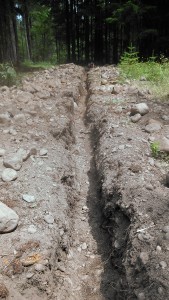
The ground, however, was mostly rocks, with a little dirt holding them together.
I spent a few weekends helping him dig this trench. (I considered it my workout for those weeks.) We used shovels and a digging bar.
And that’s how I discovered the blue-dragon-egg rocks.

I accidentally split one in two with the digging bar.
I had to capture those rocks in a story, somehow. I had a story due for the Uncollected Anthology right after that–the Winter Witches issue.
I wrote the short story The Last Dancing Leaves. However, I also recognized that I wasn’t finished with that world when I finished the story.
As soon as I could, I was able to write the novel. There were just too many tales that needed to be told.
I may still revisit this world, tell some of the stories of the small gods, like the mechanical man of Boeing field, or The Whiskered One.
Crossposted from my website. If you'd like to comment, you can do so here or there.
March 23, 2015
Free Short Story! Of Rifts and Myst
Tomorrow, my new novel Of Myst and Folly will be available.
Today, I’m letting you know about the prequel short story that I wrote for the novel.
The blurb:
It sounded like a bomb going off.
But it couldn’t have been a bomb. Or not just a bomb.
Bombs didn’t tear rifts in the sky.
Holes that opened the way for alien mists.
Nathan really didn’t care about that.
He needed to get out of the office building he was trapped in and get to his kids.
And nothing was going to stop him. Not alien mist, not magic, not even the apocalypse.
Nothing.
I wrote the story for a workshop. The anthology that I was writing for wanted stories that were set during the apocalypse. Not pre- or post-apocalypse. (The story made it onto the editor’s hold list, but never made it onto the buy list.)
This story was my take on the start of the apocalypse for the world in Of Myst and Folly.
Crossposted from my website. If you'd like to comment, you can do so here or there.

